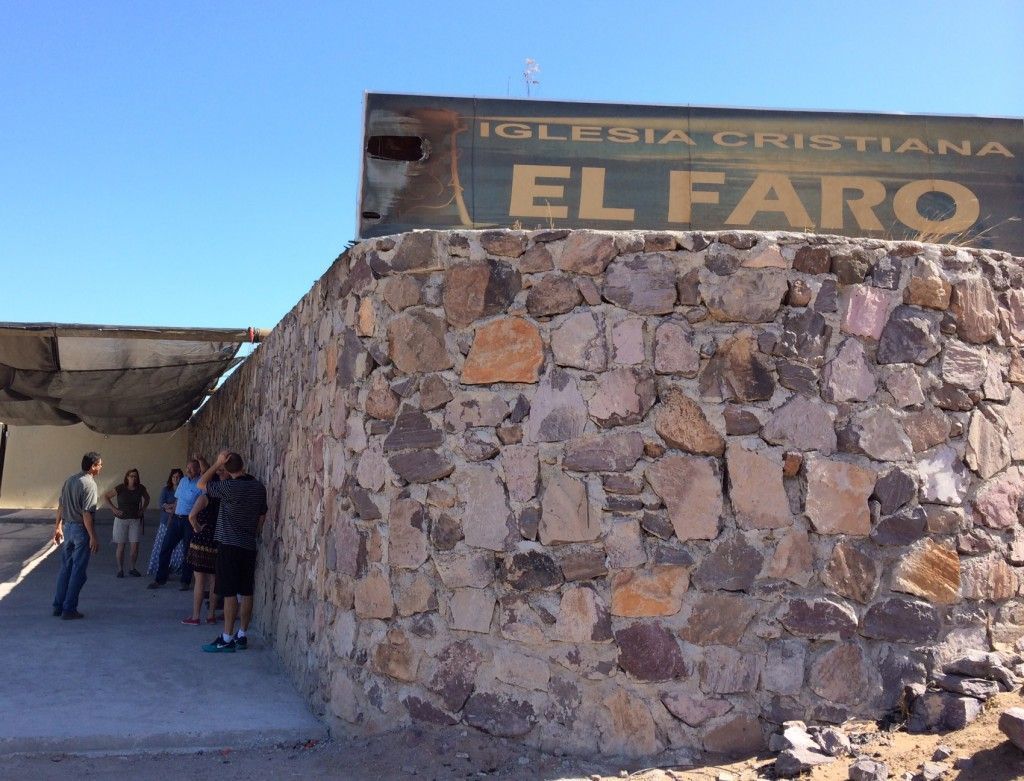Pastor Rafael Rodriguez and the El Faro congregation in La Paz know adversity. In seven years, their church in Mexico has been burglarized three times, and last year an arsonist ignited their sanctuary — just to watch it burn. But through every setback, God has refined their community and sharpened their focus.
When Pastor Rodriquez trusted Christ 30 years ago, he did not feel called to be a pastor. “I didn’t know you could be that,” he recalls. “I just wanted to serve. That’s all I wanted to do.”
Years later, Rodriquez connected with La Paz de Cristo , a TEAM church plant, where he was discipled by a TEAM missionary and trained to study God’s word. Rodriquez was launched to pastor Iglesia Cristiansto a El Faro seven years ago . Aptly named, El Faro (“The Lighthouse”) sits perched atop a hill overlooking the city.

The building of Iglesia Cristiana El Faro. Photo by TEAM staff
“I remember when I started as pastor,” Rodriquez says, “I asked God, ‘What I am going to do? Why [did] you call me? What do I have to do?'”
God led Rodriquez to simply teach the Bible and, over two years, journey with his congregation through Ephesians, verse-by-verse. Today, El Faro’s reverence for God’s Word informs its deep love for God’s people .
“We have a heart for the lost. Down here in Baja, about 20 persons die daily, and my guess is about three have an idea of where they are going. … I can’t do anything else for the people that are dead, so I need to do something for the people still alive. Hopefully they will have a chance to meet Christ. … We [have] to somehow reach the community. We have to go out.”
El Faro’s mission to change La Paz will take generations. But the people are prepared to endure because of the perseverance produced in them through suffering. Three times, thieves have broken into the church and stolen everything they had, including chairs, tables and sound equipment.
Last year, the church faced an even greater adversity when an arsonist lit their building on fire. The perpetrator was apprehended as he stood nearby to watch it burn. Left without a meeting space, Pastor Rodriquez suggested the congregation meet at La Paz de Cristo until El Faro could rebuild. The members, committed to each other and their community, refused. They continued to meet at the site of El Faro under the hot Mexican sun, week after week.
Even in the face of their own needs, El Faro remains focused on sharing the gospel through meeting the tangible needs of La Paz, a community with overcrowded schools and many in poverty. Currently El Faro has small groups and a sports ministry, but Pastor Rodriquez dreams of more for his city.
He imagines an affordable elementary school where children can be empowered through education and Christian values. He imagines El Faro facilitating a community kitchen, where meals would be served to families in need. He imagines an aerobics ministry, a radio station and Internet evangelism.
But TEAM’s senior director for global ministry, Steve Dresselhaus, points out that El Faro’s dreams for growth are not self-serving. “ I think one of the main distinctions … of this church is that El Faro Church doesn’t view itself as the goal. The church views itself as a tool to accomplish a goal. The typical church is about winning people so you can have a better ministry or a better building … [El Faro wants] all these things because the city of La Paz is so desperate and needy.”
“ I have vision for the church … I call it ‘ hormiga vision,’ which means ‘ants vision, ‘” Rodriquez explains. “You see the ants. They are all working, all doing something, and they are very strong … they can pick up 50 times [their] own weight.”
“So, I have this vision where El Faro is a church where everybody is involved in something. They are all working. They are all trying to save. They are all trying to feed somebody. They are all going to something, maybe hospitals or prison. … I see El Faro as a lot of little ants working together with one goal, trying to save the city. “




















